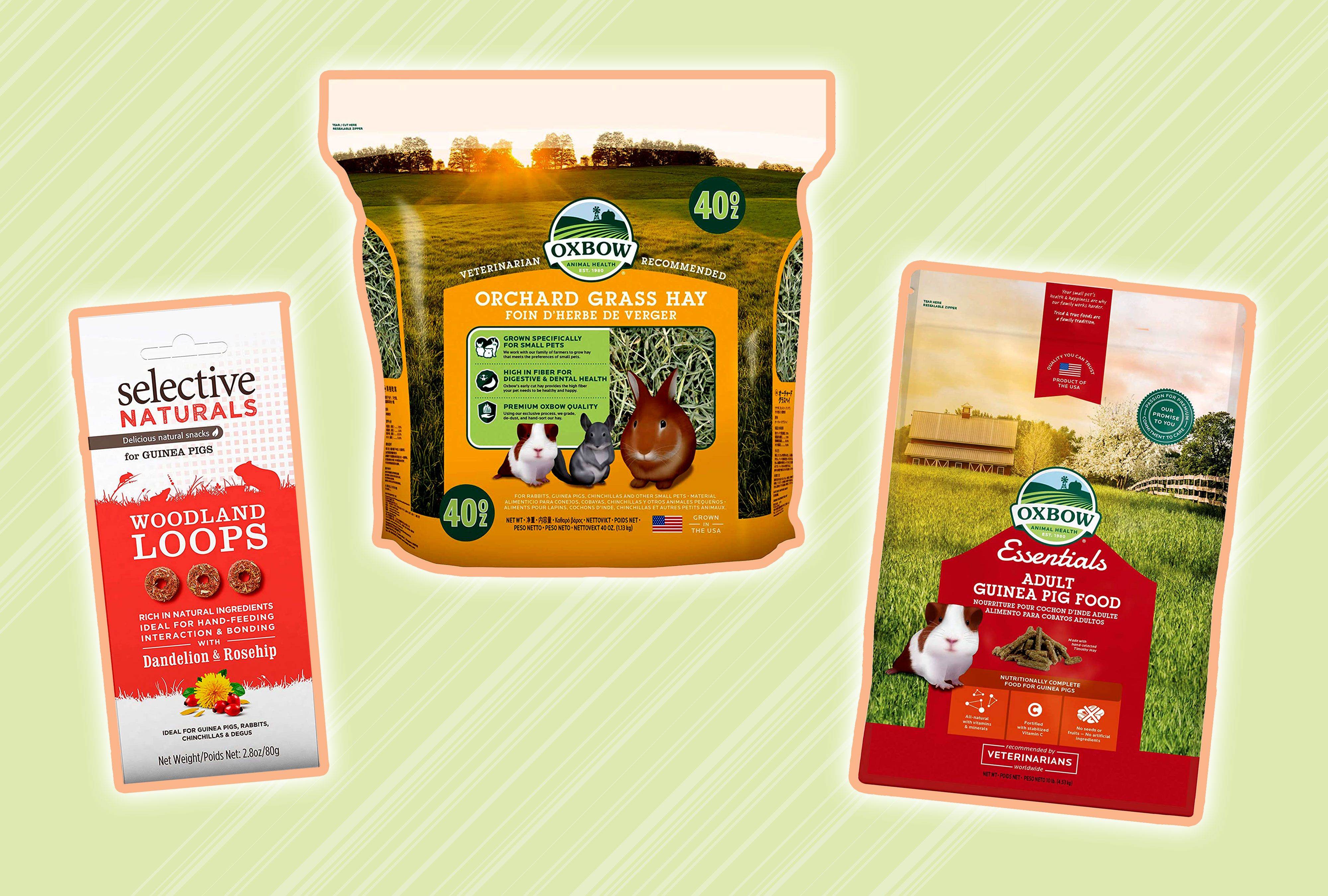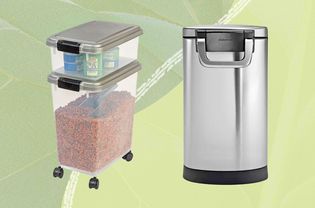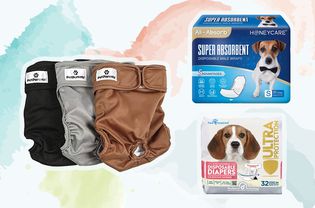
The Spruce Pets / Lecia Landis
Providing the right nutritional sustenance for a guinea pig is an integral component for keeping them healthy and happy. Guinea pigs, also referred to as cavies, are great pets that don't take up too much space and are relatively easy to care for, but the food you give your little pet plays a very important role.
According to Cheri Schubert, a guinea pig breeder and former veterinary technician, guinea pigs are herbivores, meaning they eat grass, twigs, bark, and other organic matter. They have teeth that grow continuously throughout their lives so giving them a crunchy edible helps maintain their teeth at the optimal length. And like humans, these furry little creatures are unable to make their own vitamin C so they need to ingest it along with other vitamins and minerals.
Our overall favorite food for most guinea pigs is Oxbow Essentials Adult Guinea Pig Food because each serving provides the daily vitamins, minerals, and nutrition a guinea pig needs along with a texture and uniformity that most find appealing.
Best Overall
Oxbow Essentials Adult Guinea Pig Food
Fortified with vitamins and minerals, including vitamin C
Uniform pellets without seeds
High in fiber
No artificial preservatives, colors, or flavors
Resealable bags
Not suitable for growing, gestating or lactating guinea pigs
Oxbow Essentials Adult Guinea Pig Food is made with timothy hay—which is rich in fiber—and fortified to provide 100 percent of the vitamins and minerals a guinea pig needs each day—including vitamin C and prebiotics. Plus, the food contains no artificial preservatives, colors, or flavors.
Oxbow Animal Health has been an industry-leading manufacturer of small pet food since the 1980s and their hay is sourced from farms in Nebraska. The Essentials Adult Guinea Pig Food is made into small pellets with a uniform shape and size.
Each serving will provide a consistent texture that is free of seeds, making the food more likely to appeal to picky eaters. Guinea pigs are known for being selective when it comes to their food and some will avoid eating select shapes and textures (like seeds) in their bowl. If this sounds like your cavy, it might mean they are missing out on the full nutritional benefits of their food and you should slowly transition them to a food with a consistent texture, like Essentials Adult Guinea Pig Food.
The food is packaged in three bag sizes, 5, 10, and 25 pounds, and all are equipped with a resealable zipper at the top. The larger bag of pellets may be less expensive per pound, but if you only have one or two guinea pigs, the vitamin C in the food will likely expire before your cavies can consume it all. The food is not suitable if your guinea pig is still growing, gestating, or lactating.
Key Ingredients: Timothy grass meal, soybean hulls, wheat middlings, soybean meal, cane molasses, sodium bentonite, soybean oil, salt, lignin sulfonate, limestone, yeast culture, vitamin C, vitamin E supplement | Recommended Daily Serving Size: 0.125 cups per day
Soft hay
Guinea pigs love it
Multiple bag and box sizes are available
Larger quantities may be of lower quality
All-natural product may contain insects from outside
Schubert says orchard grass is very soft and sweet and is less likely to stick in the coats of the long-haired pig. It is also less likely to poke an eye. These characteristics make it a favorite hay among guinea pig owners and breeders.
Multiple sized bags or bales are available, so you can be sure to only buy as much as your guinea pigs will eat in a timely manner. “There never can be too much hay in the cage," Schubert says. "It is a staple that can be offered free range.”
Key Ingredients: Orchard grass | Recommended Daily Serving Size: Unlimited
Best Treats
Kaytee Timothy Biscuits Baked Treats
High in fiber
Promotes dental health by encouraging chewing
Also suitable for rabbits and chinchillas
For all life stages
Made with real apples or carrots
Serving size recommendation is vague, up to 20 percent of pet's calorie intake
More fiber is always welcome in a guinea pig's diet, and Kaytee Timothy Biscuits Baked Treats are high in fiber from natural timothy hay grass. The crunchy treats will appeal to your guinea pig's chewing instincts and mastication is beneficial to their dental health.
The tasty treats come in two flavors, carrot or apple, and the respective flavor is made with real carrots or real apples. The baked biscuits are packaged in bags and sold in two sizes, 4 ounces and 10 ounces. Kaytee recommends feeding your guinea pig by placing it in the palm of your hand or by placing it in a dish, but give these in moderation. In general, treats should be given as a supplement to a guinea pig's diet and should account for 10 to 20 percent of your guinea pig's total daily calorie intake to avoid unintended weight gain.
These treats are made in the United States and are beneficial for other small pets, such as rabbits, chinchillas, and hamsters. The serving size direction is vague to address the needs of various small animals, but we recommend one or two per day for most guinea pigs. Each biscuit contains approximately 9.5 kcals and a biscuit can be broken into smaller pieces.
Key Ingredients: Wheat flour, sun-cured timothy grass hay, soybean oil, dehydrated apple, flax seed, wheat middlings, ground wheat, oat hulls, dehulled soybean meal, dehydrated alfalfa meal, dried cane molasses | Recommended Daily Serving Size: Up to 20 percent of the total daily food intake
Best Budget
Kaytee Forti-Diet Pro Health Guinea Pig Food
Contains probiotics and prebiotics
Supports dental health
Developed by an animal nutritional expert
Resealable bag
Flavor doesn't appeal to all guinea pigs
Each serving of Kaytee Forti-Diet Pro Health Guinea Pig Food is formulated to provide a cavy with a nutritious meal rich in protein, omega-3 fatty acids, probiotics, and prebiotics to support their overall health, immunity, and proper digestion. The pellet-shaped food encourages guinea pigs to chew which can help reduce build-up on their teeth, and the food is generally more affordable per ounce than other options that made our list.
The guinea pig food from Kaytee is manufactured in the United States and was developed by an animal nutritional expert. Depending on the size of your guinea pig, you might feed 1/8 to 1/2 cup of pellets per day and supplement it with hay and fresh vegetables to give your guinea pig the variety they need.
The food is packaged in resealable bags that come in two sizes, 5 pounds or 25 pounds. There are cost-effective savings with the larger bag, but if you only have one or two guinea pigs, having 25 pounds of food on hand might last longer than a year and compromise the freshness of the food.
Key Ingredients: Sun-cured alfalfa meal, ground corn, dehulled soybean meal, ground oats, ground wheat, ground flax seed, dicalcium phosphate, dried cane molasses, soy oil, ground rice, salt, calcium carbonate, magnesium oxide, potassium chloride, algae meal | Recommended Daily Serving Size: 1/8 to 1/2 a cup per day (adjust portion for proper weight maintenance)
Best Organic
Oxbow Organic Bounty Adult Guinea Pig Food
Small bag size to keep ingredients fresh
Organic ingredients
No seeds
Higher cost
Not all guinea pigs will find it palatable
Oxbow’s Organic Bounty food is a high-quality option if you are looking to feed organic food to your guinea pig. “Oxbow makes a superior food so on a small scale, if you only have a couple of guinea pigs, I recommend feeding this,” says Schubert.
A 3-pound bag of food is a great size if you only have one or two guinea pigs because it will help ensure that you are always feeding fresh food with effective vitamin C. This food has the USDA organic seal which means the ingredients are grown by certified organic farmers, but the price point will be higher than other foods.
Key Ingredients: Organic grass hay, organic canola meal, organic wheat straw, organic sunflower meal, organic barley, organic flax seed, yeast culture, sodium bentonite, limestone, salt, vitamin C, organic dandelion leaf | Recommended Daily Serving Size: 0.125 cups per day
Best for Baby Guinea Pigs
Oxbow Essentials Young Guinea Pig Food
Minimum of 18 percent protein
High-quality pellets
No seeds
5 pounds is the smallest bag size available
Schubert suggests that the best food for baby guinea pigs is "a higher protein food that is around 18 to 22 percent protein.” That means that Oxbow’s Essentials Young Guinea Pig food is a great choice for guinea pigs less than six months of age.
These pellets contain no seeds and have a minimum of 18 percent protein in each serving. They are also made from alfalfa hay and not timothy or orchard grass to provide the different nutrients growing cavies need. Guinea pig owners also rave about how their growing pigs love this formula.
Key Ingredients: Timothy grass meal, soybean hulls, wheat middlings, soybean meal, cane molasses, sodium bentonite, soybean oil, salt, lignin sulfonate, limestone, yeast culture, vitamin C, vitamin E supplement | Recommended Daily Serving Size: Unlimited
Best for Vitamin C
Oxbow Natural Science Vitamin C Supplement
High-quality brand
High in fiber
Available in packs of 60 or 180
Not all guinea pigs will find them palatable
If you are concerned about not giving your guinea pig enough vitamin C, Oxbow’s Natural Science Vitamin C Supplement is a great option to provide to your cavy. These treats are also high in fiber to aid in digestion and help prevent diarrhea.
Plus, guinea pigs love them and owners say their pigs come running for their vitamin C. The supplement is also suitable for other small pets like rabbits and chinchillas, but whenever adding a supplement to your pet's diet it's always a good idea to consult with your vet.
Key Ingredients: Timothy grass, barley flour, oat groat flour, cane molasses, vitamin C, flax seed meal, brewers dried yeast, guar gum, fat product, rosemary extract | Recommended Daily Serving Size: 1 tablet per day
Best Chew
Vitakraft Guinea Pig Treat Sticks
No artificial colors, flavors, or perservatives
Easy to hang in cage with clip included
Natural wood core can also be chewed
Hard to portion out
Each Vitakraft Guinea Pig Crunch Stick comes with a plastic hook to make it easy to hang in your guinea pig's cage. It's made with a chewable natural wood core and covered in dried fruit, honey, corn, oats, and other crunchy treats to support dental health.
Each stick is about nine inches tall, supplemented with Vitamin C, and triple-baked for a fortified consistency that's designed to optimize a guinea pig's teeth. The treat comes in multiple flavors including Apple & Orange, Fruit & Honey, Wild Berry & Honey, and Grains & Honey.
Key Ingredients: Wheat, wheat flour, yellow millet, corn, ground grain sorghum, heat-processed oats, corn starch, oats, oat groats, buckwheat, dried figs, dried apricot, peanuts | Recommended Daily Serving Size: As needed for dental maintenance
Best Compressed Hay
Oxbow Harvest Hay Stacks
All natural, no additives
High in fiber
Selected and sorted by hand
Recommended by veterinarians
Can be messy
Oxbow Animal Health Harvest Hay Stacks are made using only Timothy Hay, which is a type of hay made from leaves and stems from Timothy grass. The organic matter is then compressed and hand-sorted it into portions referred to as stacks. There is no limit on the number of stacks you can give your guinea pig each day, and this hay is high in fiber, which helps support the dental and digestive health of your pet.
Oxbow recommends placing a few stacks in your cavies' dwelling each day in an S-shape to watch them enjoy chewing while they intake the nutrition they need. And while your guinea pig is extremely likely to love this hay, it will inevitably result in a mess that you'll need to tidy up.
Key Ingredients: Western timothy hay | Recommended Daily Serving Size: Not listed
Best Sticks
SunGrow Sweet Bamboo Chew Sticks
No dyes, artificial flavors, or artificial colors
100% natural bamboo sticks
Low-calorie, high-nutrient, and high-fiber snack
Sweet xylose flavor encourages chewing
Not many sticks in a package
SunGrow Sweet Bamboo Sticks are formulated for rabbits, hamsters, guinea pigs, chinchillas, and other small furry pets. The sticks are an ideal snack and chew toy for guinea pigs because they're low-calorie, high-nutrient, and high-fiber so they won't contribute to obesity and health issues. Plus, they're made with no dyes, artificial flavors, or artificial colors.
The sweet xylose flavor makes them more appealing and encourages guinea pigs to happily gnaw away as they trim down their teeth. Each package contains about 8 sticks, making this a rather pricey treat. Nevertheless, these sticks provide a good alternative to seeds and sugary snacks while aiding dental and digestive health.
Key Ingredients: Natural bamboo | Recommended Daily Serving Size: Not listed
Final Verdict
Oxbow offers high-quality foods at fair prices, especially if you care for a number of guinea pigs and can purchase it in bulk. Oxbow Essentials Adult Guinea Pig Food is a great all-around option for guinea pigs over six months of age. It is affordable, widely available, and provides the nutrients like vitamin C that guinea pigs needs from their pellets. These pellets should always be offered alongside a high-quality timothy or orchard grass hay, so Oxbow Orchard Grass Hay is a great option to fulfill the rest of your guinea pig’s needs.
What to Look for in Guinea Pig Food
Formulated for Guinea Pigs
The most important things to look for when selecting a guinea pig food is to make sure the food is designed for guinea pigs and that the date of milling is as recent as possible. Foods that are milled more than a few months ago will begin losing their vitamin C, and foods that are not designed for guinea pigs may not have as much as a guinea pig needs. Next, avoid foods that are high in fat and calories like seeds and sugary treats as these will contribute to obesity and health issues.
Milling Date
“All guinea pig feed contains a supplement of Vitamin C. It is very important to make sure you understand the milling process date and that it isn’t more than four months old," explains Cheri Schubert, a guinea pig breeder and previously Registered Veterinary Technician.
"Also, when you open the pelleted feed, store it in a plastic container to continue to preserve the vitamins and minerals and freshness.” This means that if you are choosing a pellet designed for guinea pigs, it will contain vitamin C, but you need to make sure the food isn’t more than four months old and you store it appropriately.
-
What human foods can I give my guinea pig?
Several human foods can be offered to guinea pigs as treats. Schubert notes that Cheerios and quick plain rolled oats are popular options, along with vegetables that are high in vitamin C and some fruits.
Bell peppers, kale, leafy lettuce, green beans, parsley, cilantro, strawberry tops, and cucumbers are great vegetable options. Be sure to limit starchy vegetables like sweet potatoes and carrots, and avoid gas-producing vegetables like cabbage and onions.
-
Can guinea pigs eat rabbit food?
“Guinea pigs can be fed rabbit food on a very limited basis,” says Schubert. Rabbit food lacks the nutritional components, primarily adequate vitamin C, that guinea pigs need, so it should never be fed to a guinea pig long term.
If you absolutely cannot find guinea pig food or are running low and can only find rabbit pellets, you can temporarily mix your rabbit and guinea pig pellets or feed the rabbit pellets until you can get more guinea pig pellets. Vitamin C deficiency is a serious problem and will negatively affect guinea pigs that don’t get adequate amounts in their diet.
-
Can guinea pigs eat any other type of pet food?
With the exception of feeding rabbit pellets for a very temporary time, Schubert says, “I would not recommend any other pet foods for a guinea pig. Many of the other foods contain things that guinea pigs shouldn’t eat.”
-
Which human foods should guinea pigs never eat?
Some human foods that you should never feed guinea pigs include avocados, grapes, raisins, coconut, and varieties of alliums such as onion, garlic, and chives—all of these can be toxic. Additionally, you should avoid feeding them sweet or salty human “junk food.”
In general, it's best to stay away from foods that are high in starch, carbohydrates, and fat, even if they are deemed "healthy" for humans. A guinea pig's diet should consist of hay, high-quality pellets, and occasional treats of fresh fruits and veggies.
-
What type of containers should be used to feed a guinea pig?
For food, heavy ceramic crocks or bowls that are tall enough to clear their bedding are ideal because they don't tip over easily. You keep separate bowls for pellets and fresh vegetables, as well as a hay tray for foraging. Sipper bottles offer convenient access to water, though they should be cleaned and refilled with fresh water daily.
Why Trust The Spruce Pets?
Adrienne Kruzer is a Registered and Licensed Veterinary Technician in three states and has been writing about pet and vet topics for over a decade. She is also Fear Free Certified, has a special interest in exotic and pocket pets, pet nutrition, and loves researching, learning, and problem solving in order to better help pet owners. Her years of working in various animal hospitals with dogs, cats, wildlife, and exotic pets like guinea pigs, alongside her formal college education and elective continuing education classes, have provided her with a wealth of experience and knowledge to help guinea pig owners select the right food for their pet.
Cheri Schubert was not only a Registered Veterinary Technician in her life before Human Resource Management, but she also breeds and shows champion guinea pigs. She is a member of the American Cavy Breeders Association, American Rabbit Breeders Association, and the Ohio Cavy Club and runs Crafty Cavies and Seminole Winds Cavies where she has raised show and pet stock for over 12 years. Texel, teddy, silkie, and Swiss guinea pig breeds are her specialties.
:max_bytes(150000):strip_icc()/AdrienneKruzerRVTLVT-41ee5d17efea4c9b8b5e9ac59e3f608c.jpg)

:max_bytes(150000):strip_icc()/Andrew-Whalen-Bio-Photo-f4854d3e9d7b46d98b8c527fec97e724.jpg)
:max_bytes(150000):strip_icc()/oxbow-essentials-adult-guinea-pig-food---all-natural-adult-guinea-pig-pellets---10-lb-e8588d272c804f788f926ef5801125db.jpg)
:max_bytes(150000):strip_icc()/oxbow-animal-health-orchard-grass-hay---all-natural-grass-hay-for-chinchillas-rabbits-guinea-pigs-hamsters--gerbils---40-oz-8bf42a2a16084c129ae08bc38091f402.jpg)
:max_bytes(150000):strip_icc()/KayteeBakedAppleTimothyBiscuitSmallAnimalTreats-d631132e2c874e0c86e2f501f063430a.jpg)
:max_bytes(150000):strip_icc()/81FBlbvE6oL._AC_SL1500_-4227c8b928b448428b9dc91de21422d6.jpg)
:max_bytes(150000):strip_icc()/oxbow-organic-bounty-adult-guinea-pig-food-3-lb-bag-4db9b02eeb9d4072bd956f712a5f7914.jpg)
:max_bytes(150000):strip_icc()/oxbow-essentials-young-guinea-pig-food---all-natural-guinea-pig-pellets---5-lb-547bc9d31b0248e2a1782f2e8498c5cf.jpg)
:max_bytes(150000):strip_icc()/oxbow-natural-science-vitamin-c-supplement---vitamin-c-for-guinea-pigs-and-other-small-animals-42-oz-8e7678459fa649478795205ef459f2ef.jpg)
:max_bytes(150000):strip_icc()/vitakraft-guinea-pig-fruit--honey-treat-sticks-2-pack-35-ounce-7ef287f9f9734221b3863c409e1a045e.jpg)
:max_bytes(150000):strip_icc()/61RFA2X12nL._AC_SL1467_-d5b62aec42b549dbb1b79c54bf7d3b28.jpg)
:max_bytes(150000):strip_icc()/Screenshot2024-08-20at8.32.57AM-a29e512b18194df5acc1cb70639d92a6.jpg)




